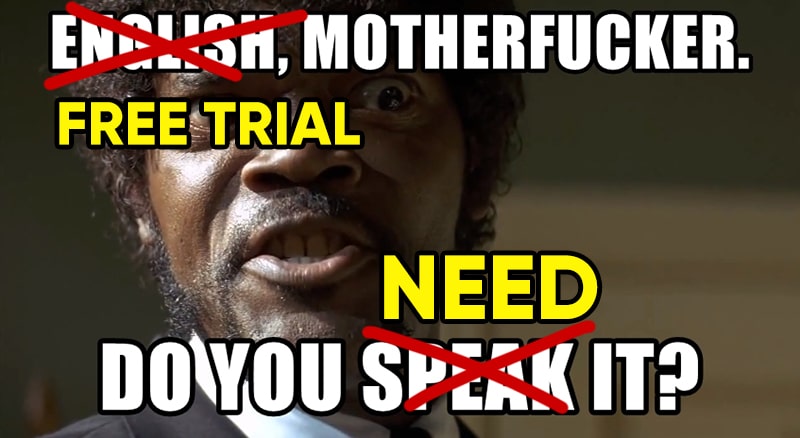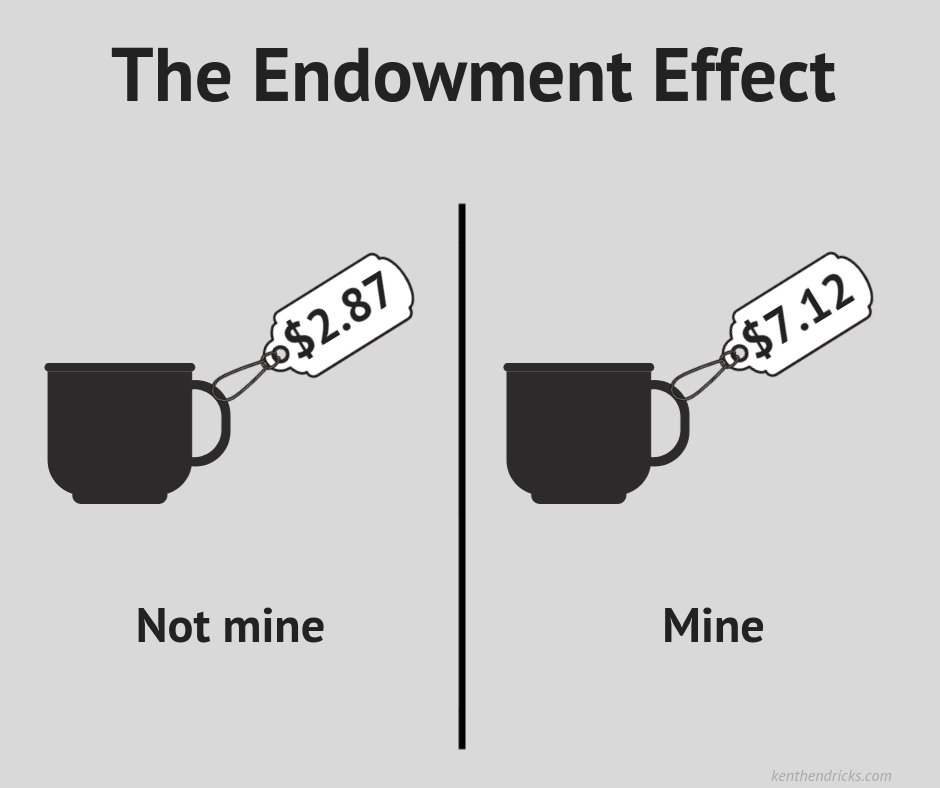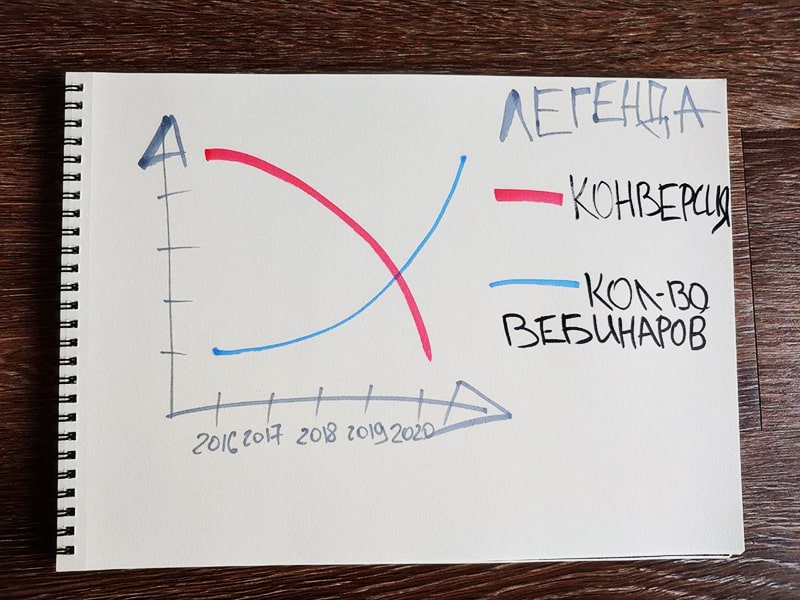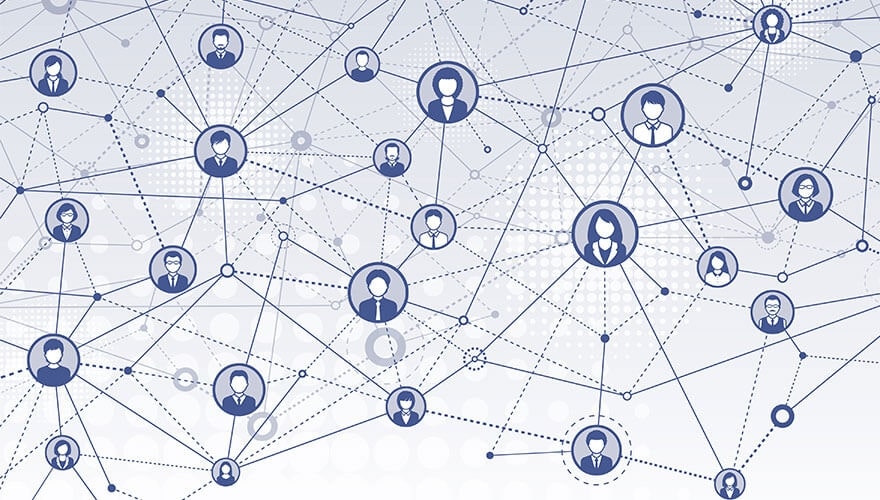- A few days ago, in my article on the habit formation framework, I promised to talk about why we use the PAYED VS free trial period in our products.
- The guys at Getcourse wrote a plus-sized article about online schools , which in my opinion contains some very HARMFUL tips, which I will comment on below.
- DimBochshared his opinion about small business in the USA , which is very close to the truth, but requires a little clarification, which is directly related to the topic of this article
Well, and most importantly: our FREE annual subscription to Habr, which we received thanks to the project to support startups, ends at the end of August. And despite the fact that I am very ashamed that for the whole year I wrote only 3 articles here, this is a great example of why free "demo periods" are not suitable for everyone.

Under the cut, we will get acquainted with another dose of theory from the field of behavioral economics, discuss successful and failed examples of free trial periods and freemium models, talk about the misconceptions of the guys from GetCourse and figure out why everything is so bad with marketing in the USA.
Despite the fact that last time you did not really appreciate dozens of graphs and links to academic articles, I will still try to start this article with a small theoretical insert that formed the basis of Fremium models and set the fashion for free demo periods.
The Endowment and Loss Aversion Effects - two brothers who have a key influence on all marketing campaigns
The American approach to marketing is radically different from the CIS. And, despite numerous misconceptions, the CIS is in no way inferior to the American one, it is simply different (more on that below).
Nevertheless, there is one thing, which, unfortunately, is completely ignored by domestic marketers: attentive (I would even say reverent) attitude to research results, which often become the foundation of advertising campaigns of American colleagues. But in vain.
Endowment effect
The “ownership effect,” which sounds a little clumsy in Russian, is that people tend to overestimate the things they own (and underestimate the things they don't own).
One of the striking examples is the sale of houses / apartments in which people have lived for a long time. In most cases, the seller estimates his living space significantly higher than the market value and the expectations of buyers.
Over the past 50 years, scientists have found numerous evidence of the effect of ownership in practice:
1. Heberlein, T. and Bishop, R. (1985) found that hunters who were not willing to pay more than $ 31 for a hunting license did not agree to resell it after obtaining less than 138!
2. People who bought lottery tickets for $ 1.28 are not ready to resell them for less than $ 5.18 (despite the fact that this money can buy 3 more tickets and increase their chances of winning according to research by Knetsch, J. & Sinden, J. (1984) .
But one of the most striking demonstration of this effect is obtained through experiment Kahneman, D., Knetsch, J., and Thaler, R. ( 1990) , in which they divided the people into three groups: sellers (which are issued by circles, and asked to estimate for what price they are willing to sell them), buyers (who should have bought the mug from the seller) and "observers" (who had to estimate the real value of the mug, without having to buy).
And this is what came of it:

In other words, the owners of the mugs valued them more than 2 times more expensive than those who are going to buy them.
Numerous repeated experiments confirming this phenomenon formed the basis of marketing campaigns and had a direct impact on the emergence of freemium models and all kinds of free demo periods in the late 80s in the United States.

Armed with this knowledge, leading marketers have tried by any means to "foist" the customer on the product for a long time, so that he had the opportunity to "relate" to the product. One of the pioneers was all kinds of MLMs, like the guys from Amway, who left future victims with bags with a variety of products, offering to calmly test the “with no strings attached” line of products for a long time.
But speaking about the endowment effect, you just need to pay attention to the " loss aversion ", which maximally complements and expands the meaning of the first.
Loss Aversion or a thing that you forgot to translate into Russian
Remember above I said that domestic experts often neglect research? Loss Aversion is a direct confirmation of this, about which there is not even a Wikipedia page in Russian.
This "untranslated" effect implies that people do their best to avoid losses. But the key feature of this effect is revealed in the picture below:

For those who have not signed up for our marathon to learn English, the inscriptions on this graph demonstrate that the pain of loss is significantly higher than the pleasure of making a commensurate profit.
According to fundamental research Tversky, A. & Kahneman, D. (1992), which has collected a huge number of citations, this ratio looks like 2.25 to 1m. In other words, to justify the risk of losing 100 rubles, the potential benefit must be at least 225 rubles. For gamblers, this threshold is noticeably lower, which, by the way, is readily used by bookmakers.
And in order not to overload you with redundant theory, let's finally return to the main topic of our article:
Freemium models and Free trials have become hugely popular due to the simultaneous use of two fundamental factors that influence decision-making: Endowment and Loss Aversion effectsOn the one hand, the user avoids the problem associated with the fear of financial loss, on the other hand, he begins to value the product more due to the ownership effect. Such a bundle, sewn into the "root" of the freemium versions of applications and free demos, at first gave great results. And all would be fine, but a terrible thing happened:
Almost all products on the market began to massively use this model. Even those who, IN PRINCIPLE, should not do this. Many B2B and “complex” B2C products are losing huge numbers of potential customers trying to replicate successful examples of advertising campaigns in the past. Why?
Because Loss Aversion is not only about financial losses... Today, when each of us is daily "flooded" with an ocean of information literally from all sides, the value of the time spent is compared (and in developed countries - exceeds) with material costs.
In addition, the effectiveness of the "effect of ownership" continues to plummet as the market becomes saturated with free offers. It is one thing to be able to access a product for free at a time when such offers can be counted on one hand, and it is another thing to face a situation where every first product has free access.
It was not for nothing that I mentioned an article from Getcourse that talks about the state of online schools in the market. The technique described there is dying fast.
The tale of an advertising campaign, which consists of a warming up advertisement for a "free webinar", which later closes on the purchase of a course wiped out to the holes by numerous info-gypsies who teach beginners how to get rich quick at all kinds of courses on "producing producers for experts" (By the way, the link "producer -expert ”, which is mentioned in the same article, also looks ridiculously info-gypsy, and it's a pity that you are promoting these ideas, but this is a topic for a separate article).
Now I'll show you how it looks in practice:

The more aggressively an idea is forced by the info-gypsies, the faster it dies. For two reasons:
- the market is oversaturated with the same type of content
- the market is oversaturated with the same type of UN-QUALITY content
In pursuit of quick money, many "experts" with "producers" are rapidly riveting one-day products on their knees, which have a negative impact on the entire market.
Having visited several free webinars, where for an hour the "expert" pours water about his expertise and rolls out an offer to buy unnecessary garbage at the end of the broadcast - a potential client simply ceases to seriously consider such offers. By inviting such a person to the next free webinar, you, in fact, lose the opportunity to convey any information to him. Even if you have a good product.
It is useless to jerk a person with banner blindness. It has already been processed by dozens of free webinars and demo lessons, which in most cases leave a negative impression and are associated with a waste of time. A similar situation occurs with all kinds of free demo accesses that hang on "every pillar".
If you've ever looked for language learning courses, you've probably stumbled upon offers of free lessons. Skyeng invites you to a free lesson, a smiling person on the landing page, downloaded from stock, invites you to a free lesson, even an offline school around the corner of your house - and she invites you to a free lesson.

Cool, cool, interesting. But I have already watched hundreds of landing pages, and even attended dozens of free lessons and webinars, and I have doubts that you will offer me something new and interesting. WILL NOT GO.
In his post the day before yesterday, DimBoch wrote a very nice paragraph on differentiation:
To the right and left of you are fishermen with the same tackle. Your floats are at the same level from the shore, and everything seems to be the same ... How to make a dash? Stop standing in the same row with them. You should not be compared to others . Your rod should be cast further or be of a different design.
But why are most ad campaigns and offers no different from the competition? In America, every first startup is built around free demos or freemium models. Are the fools there?
Yes and no. According to the author of the previous article, most American (and domestic) business is doomed to mediocrity due to the fact that they do not know how to delegate. And I fundamentally disagree with this statement. Americans are VERY good at doing two things: selling with corrupt scripts and delegating. But about 99% are not good at marketing.
Although no, I'm lying. He doesn’t “know how,” they simply do not have enough funds. As a person who has worked in the Russian and American marketing markets, I am convinced that digital marketing in the CIS is often much more developed than in the States. And there is a simple explanation for this: in Russia, every second businessman can afford to hire an SMM operator for 5-15 thousand rubles a month, and test all sorts of advertising messages for a penny, while the American market is arranged differently:
Companies (usually large corporations) either turn to marketing agencies that charge a LOT of money or hire their own in-house specialist. The only problem is that small and medium-sized businesses, including start-ups in the US, often cannot afford to hire a marketer, who often needs a PPC specialist, SEO, copywriter and designer for their team (each of which will cost the company from $ 50 thousand). per year including taxes).
What happens in the market as a result? - these same 99% of companies blindly repeat those ten corporations that have paid millions of dollars for their advertising campaigns and are guided by clearly-written KPIs that will not satisfy most competitors .
Most of the companies offering free demo and freemium models do not fully realize that with every lead (potential client) they receive, an active work should be done to “close” it.

It was not in vain that Alec Baldwin's character in Glengarry Glen Ross tried to convey to salespeople the key essence of the business: "Always be closing" (always "close"). And closing it requires certain resources that are not available to most companies, which collect a huge amount of "junk" traffic from free offers.
But are Freemium models and free trawls not effective at all?
Effective, but for certain areas. Especially for those who need the so-called "network" effect, that is, their development directly depends on the number of users. A good example would be dating-related companies / applications (the same Tinder: the more different users, the more likely you are to find a person according to your preferences), online games, and probably a lot more.

However, before offering your next free demo, evaluate a) how difficult your product is to use and b) how much resources you need to spend on turning a person into a paying customer.
In my opinion, it is much more efficient for small companies to build marketing campaigns around tripwires - a “trap” product with a low price and great value for a potential client. This approach solves THREE key problems at once:
- most of the garbage traffic is eliminated, so you can spend more time on "closing" the clients who paid for the tripwire / demo
- A lot of research and common sense says the hardest selling to a customer is the first one (remember Loss Aversion?). Making a follow-up sale after a small first payment is much easier than after a free trawl / webinar / demo lesson
- (endowment effect) , / , . ? , , . , , , .
For ten years of work as a marketer with a variety of projects for American and Russian clients: from small startups and kickstarter projects (by the way, this article about Kickstarter , written 6 years ago, has not lost its relevance), to the largest consulting companies, I have repeatedly convinced of the effectiveness of the above approach.
And if ethical considerations and NDAs do not allow to speak openly about clients' projects, I will gladly share my observations from my project for learning English: refusing free demo periods and webinars increased the effectiveness of an advertising campaign by more than 5 times... The introduction of a trial week for 250 rubles helped not only significantly reduce the cost of the client, but also significantly increase user involvement in the learning process.
If you have read the previous article on habits (and if you suddenly didn’t read it, it’s interesting ), then perhaps remember that the key "difficulty" of our language learning marathon is that it is critically important for the user to understand the need for daily classes.
So, during the tests with free demo access, the number of people who responsibly treated the daily activities could be counted on one hand. At the same time, the guys who paid the symbolic 250 rubles are much more responsible in the study of materials and daily lessons. And as a result, they are easier to integrate into the learning process.
And finally, let's return to the story with free access to the corporate blog on Habré. This is a really AWESOME perk that has tremendous value for young startups. But there is one thing.
Writing an article on Habr is a very laborious process that takes a lot of effort, emotions and time. When you pay for a corporate blog for a year for 432 thousand rubles, there are no options NOT TO WRITE. When you get it for free, there are always a million more important problems that need to be solved right now. And to write is "sometime next time." Until you make it to the last month.
A lot of cool and valuable products have a similar picture with free access, especially if it takes a lot of effort to successfully master them. But in order not to be an asshole, I will try to devote the whole August to Habr to prepare some interesting articles for you.
For example, tomorrow I will talk about an incredibly simple but effective technique, which I got to know thanks to the Fulbright grant (the article about which gave me an invite to Habr), which sent me for 5 years to incredibly atmospheric Louisiana.

Lagniappe is a Creole word brought to New Orleans that helps win the hearts of thousands of American businesses through primitive action. But more on that tomorrow.
Thank you for attention.
PS What do you think about freemium products and the need for demo access? And have you ever watched downloaded pirate courses (if ever)?